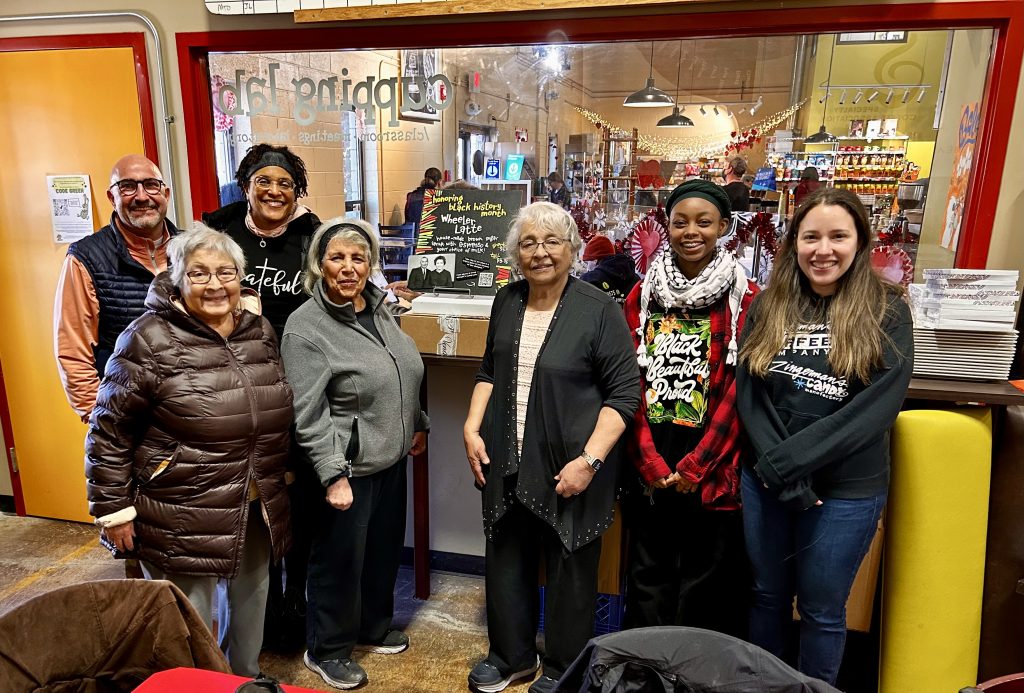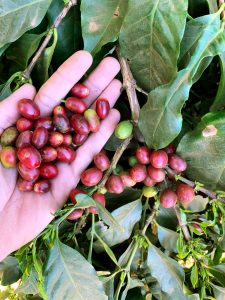The Wheeler Latte
Paying homage to one of Ann Arbor’s great historical leaders
By Ari Weinzweig – From Ari’s Top 5 Pick Newsletter, February 14th, 2024
On Monday, April 7, 1975, Albert Wheeler was elected as Mayor of Ann Arbor. I was entering my eighth month at the University of Michigan, a freshman who was mostly focused on finishing my first year at college without completely failing my finals. I saw Mayor Wheeler’s name in the newspaper now and again, but beyond that, I paid little to no attention.
Had I been practicing Folklorist Leadership, I would have tuned in much more closely! Wheeler’s election as mayor, I realize many years later, was monumental. He was the first and only Black man (to date, at least) to be elected mayor of this town, a town in which most people who aren’t Black will not know that in the years leading up to Wheeler’s election, had still been segregated through a series of nearly unspoken norms. As the Ann Arbor News later wrote,
Far away from the segregated lunch counters and water fountains of the Deep South, Ann Arbor was wrestling with its own brand of racism in the 1940s and 1950s. Blacks moving to town were only shown houses in the North Fourth Avenue area, a grimy neighborhood heavy with the odor of slaughterhouses and coal-fired plants. Jobs for African Americans at the University of Michigan usually got no better than cleaning floors or operating elevators.
Mayor Wheeler was born in the city of St. Louis back in 1915. He studied biology at Lincoln University, an HBCU in Pennsylvania. He came to town in the late 1930s to study at the School of Public Health at the time that the Great Depression was winding down and the geo-political tension in Europe that was about to turn into WWII was increasing. In 1945, when Wheeler and his wife Emma attempted to buy a house, the banker continually pushed them to look at buying only in Black neighborhoods. Nevertheless, the pair persevered. In 1952, Dr. Wheeler became the first Black professor at the University to be tenured. The Wheelers would go on to be instrumental in the founding of the Ann Arbor chapter of the NAACP. He first stood for mayor, unsuccessfully, in 1970, but ran again in 1975 and won.
As mayor, Wheeler worked to change beliefs about what a city government was supposed to do, advocating significantly increased services for its citizens. His path was not an easy one. Even in our fairly “liberal” city, he faced verbal and physical threats. Nevertheless, he pushed forward, working to help disadvantaged members of the community, create effective public housing, and more. He has been credited with instilling the idea that city government should be actively involved in human services, and that’s something the city continues to do. The Ann Arbor News noted that “a pattern of scattered public housing on small sites throughout Ann Arbor is another Wheeler legacy,” and that Wheeler “worked to avoid the large, isolated housing projects that other cities built with public funds.”
As Wheeler explained his deep dedication to working for Civil Rights in the city, “I thought I was working for what I was entitled to as a human being.” His daughter Mary McDade, an appellate court judge in my home state of Illinois, talks about how her father led with positive beliefs: “He recognized that as women and as Black people, it was going to be an uphill struggle to do anything in this life.” And yet, McDade says, “He was constantly reminding us that if you used your brains, if you applied yourself, there was nothing that you couldn’t do.” Wheeler’s daughters described how dinner conversations were always centered around politics (as long as their grades were good!). They attended marches as young children, and their parents ignited a fire inside them to carry forward their mother and father’s work. Mary and Nancy became judges. Alma became a state senator. And in their 70s and 80s, they are all still politically active to this day!
Albert Wheeler passed away at the age of 78 in 1994. In 1987, five years after we opened the Deli, the name of what had long been called Summit Park, a few blocks to the north of us, was changed to Wheeler Park. The plaque at the park says it well: “The city of Ann Arbor is a better place to live because of the Wheelers.”
In order to honor Albert Wheeler’s good work, and mark what is now nearly a half-century since he became mayor, the Coffee Company has created what we’re calling “The Wheeler Latte.” It’s a super tasty coming together of the Coffee Company’s Espresso Blend #1, a housemade Demerara brown sugar syrup, and steamed milk that comes in from Calder Dairy in Carleton, Michigan. In one of those great coincidences that are really only made possible by being so rooted in the local community, Wheeler’s grandson, Conan Smith, happened to come into the Coffee Company just as the crew was engaging in conversations about this new coffee drink! Conan, a long-time customer, has continued his grandparents’ community work, and served as the CEO of Michigan Environmental Council.
The Wheeler Latte is a tribute to Al Wheeler’s wonderful work here in the 20th century, and also a recognition of what we can all do to build on his caring community contributions. Order one up this week and make a toast to the mayor’s memory as a salute to the social improvements that he worked so hard to make happen, and that all of us remain responsible for today in 2024!
…………………
The Wheeler’s 3 daughters, Mary, Nancy & Alma, as well as two of the Wheeler’s grandchildren, Conan & Sara, visited the Coffee Company on February 12th, 2024 to talk with us. Below are some photos from their visit.
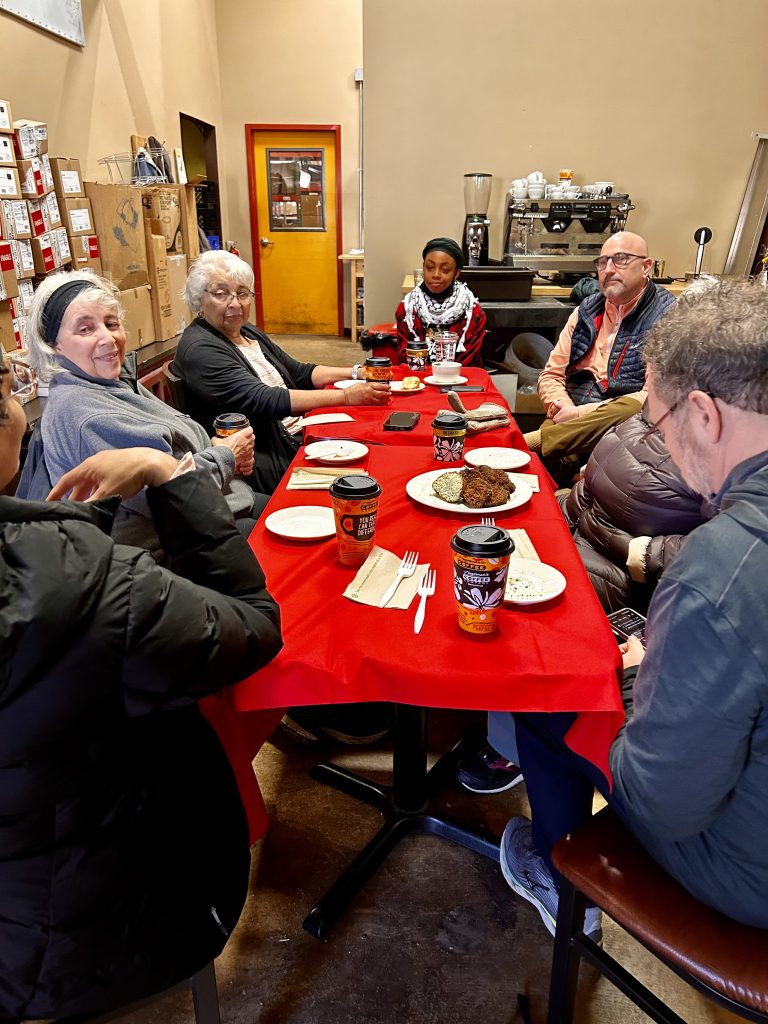
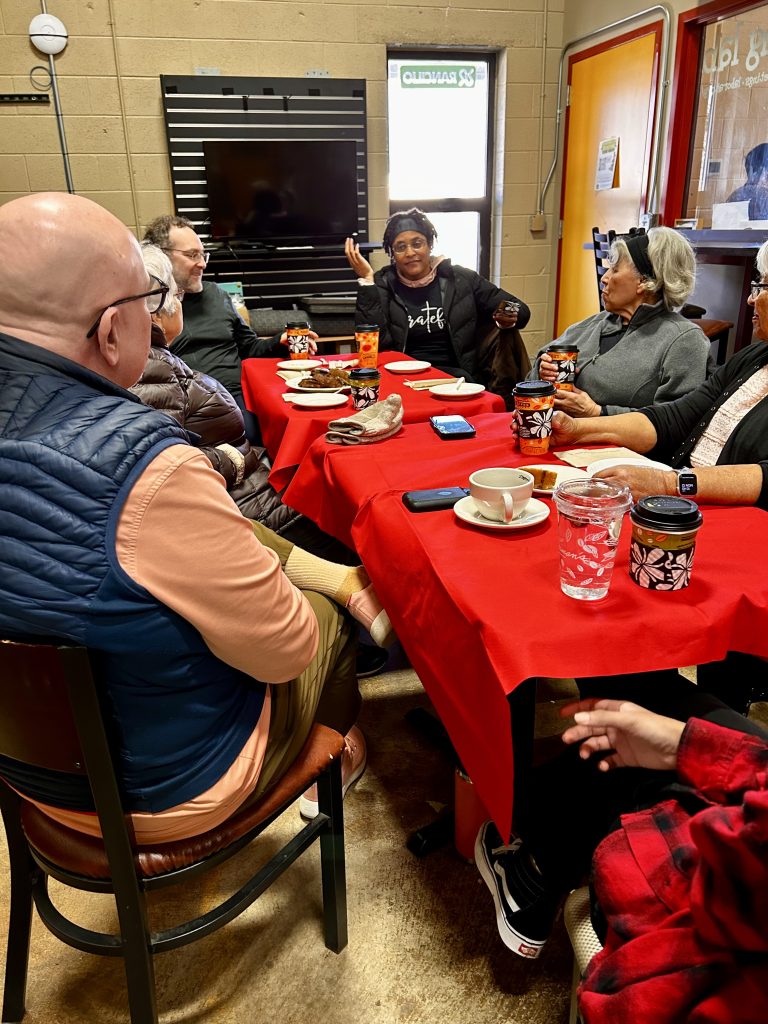
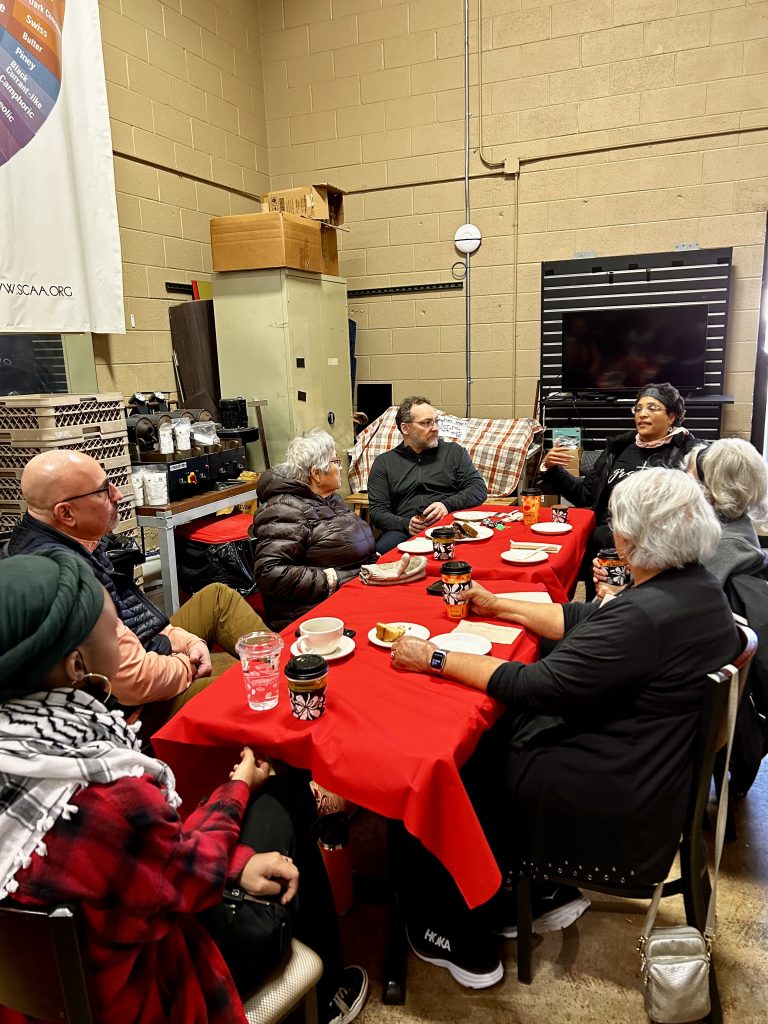
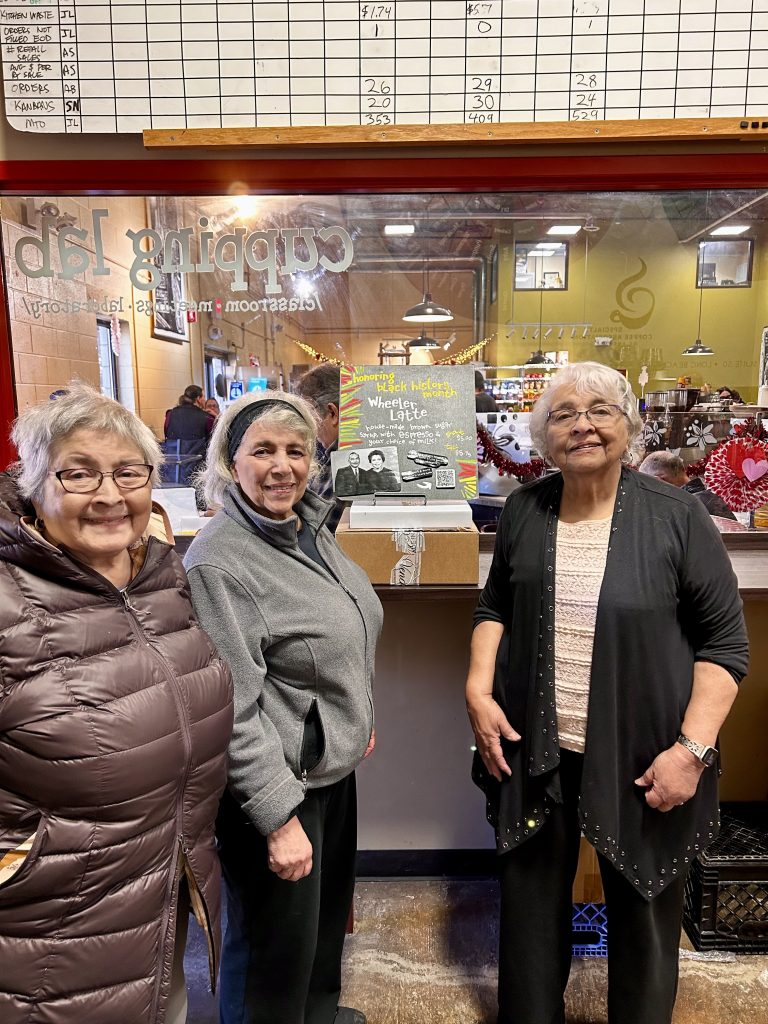
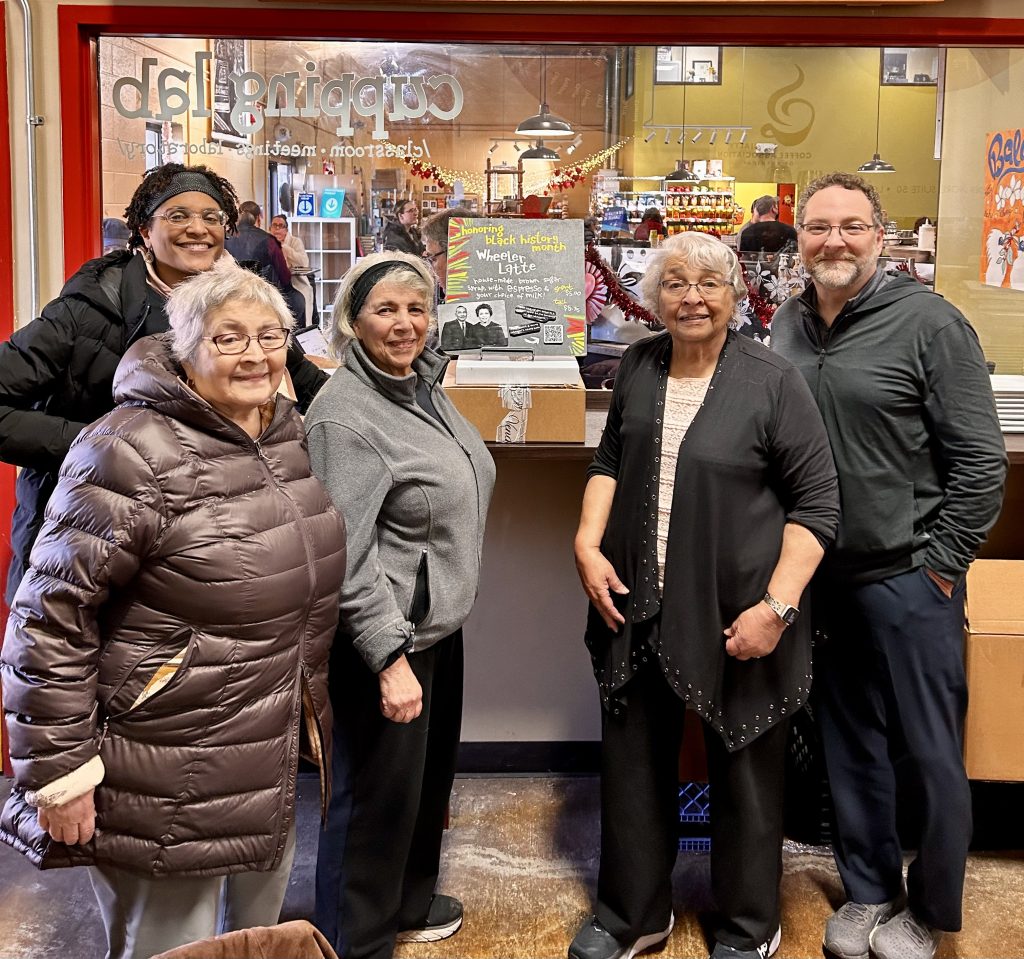
Our Experimental Coffee Trees
News from Steve on coffee trees being cultivated in Brazil, exclusively for Zingerman’s
Latest Update: September 8th, 2021:
Our friends at Daterra Estate in Brazil have been working diligently despite the global pandemic on our ongoing coffee growing project, our plot of the Pacamara coffee varietal.
Our trees – which we, unfortunately, were not able to visit this year to said pandemic – continue to develop slowly but steadily. The report is similar to last year, and promising: harvest began a bit later than for other trees on the farm, not unusual for young trees. We continue to see lush vegetative growth – a good sign of healthy trees.
In June, 2021, 12-13 pickers began harvesting our Pacamara trees. An even more exciting sign that our trees are thriving are the abundant clusters of beautifully matured fruit.
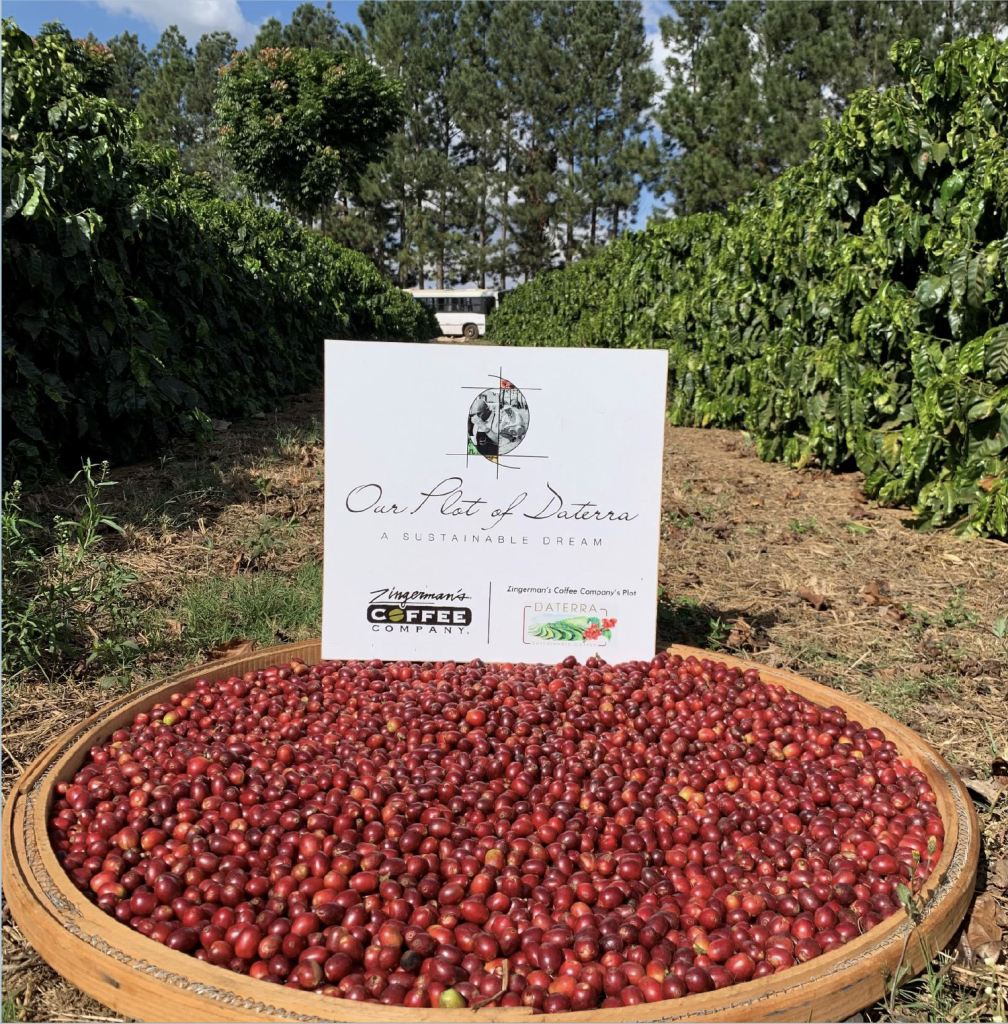
In Brazil, harvest is annual – once a year – and it starts around May, and finishes around August. Our beans matured beautifully; 98% of what you see in basket is matured coffee fruit.
Another exciting report from Daterra is that we’re reached the stage where our shade trees have produced a canopy. This means that we can indulge in the other part of our experiment: seeing how full-sun versus shade-grown affects taste.
After patiently waiting for five years for our plot to develop – with no certainty promised regarding its success – it’s wildly exciting to see such great results early on.
Our trees produced enough to allow us to experiment with a variety of processing methods.
The report back from Daterra:
- #1 washed. Tobacco, black tea, molasses, red fruit were the tasting notes.
- #2 was honey processed – fruity, orange, hazelnut, yellow fruits, citric fruits
- #3 was cherry fermented 24 hours. Ripe fruits, juicy, black plum, peach.
- #4 anaerobic fermentation 24 hours. Florals, orange, peach, tangerine, honey, floral nut.
- *#5 same but 48 hours (longest). Lots of orange, dark berries, raisins, red wine.
- *#6 Natural dried from ripe cherry. African style natural. Dried on raised bed.
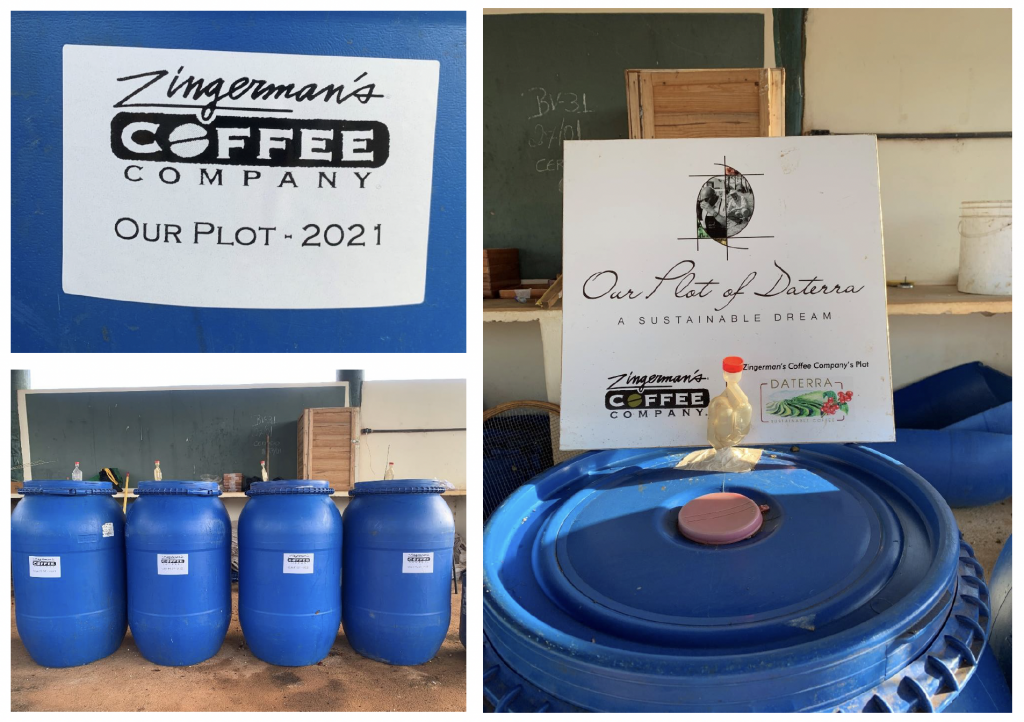
24 anaerobic fermentation. Fermentation occurs naturally with coffee fruit, but this process is controlled in vessels. The coffee fruit is deprived of oxygen to achieve a prized flavor profile.
The stand-out to the Daterra team was the anaerobic fermentation. They scored this coffee points above the rest, flavor profile-wise. Another stand-out – and one of our favorite processing methods – was the natural process. We’ve narrowed down to these two processing methods for the 2021 harvest.
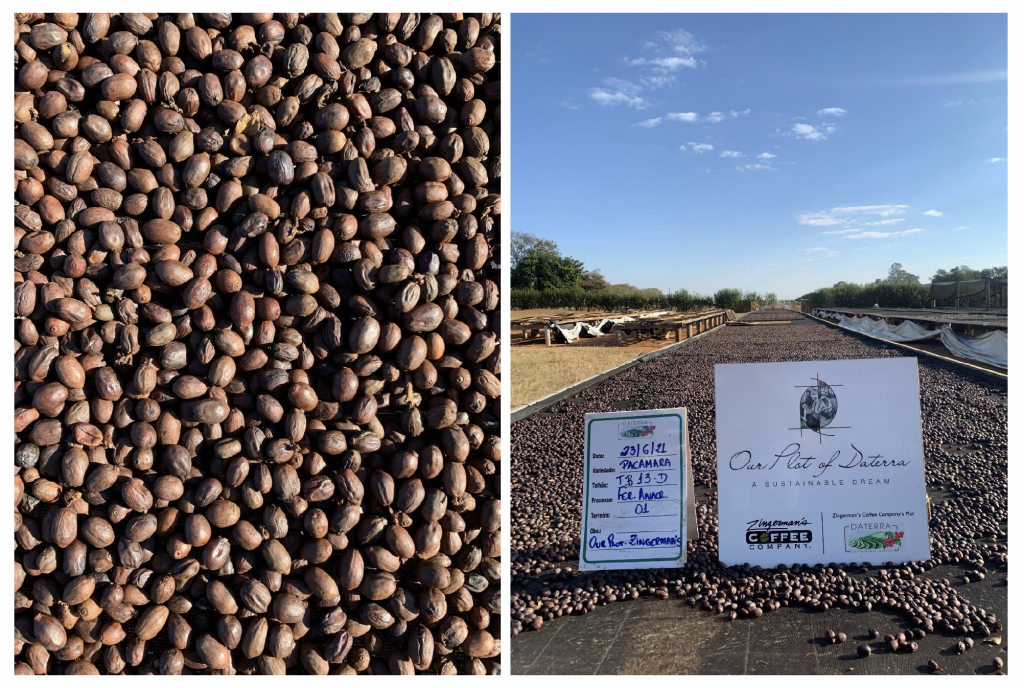
Coffee fruit dried on raised beds. This processing method raises the cherries off the ground and allows for air circulation. Clean cherries that have been dried consistently, like these, result in a consistent coffee.
This year, we did not separate shade-grown and full-sun – that’s an aspect of the experiment we’re looking forward to indulging in next year.
Update: August 20th, 2020:
The harvesting of our Pacamara coffee cherries is underway at the farm! The folks at Daterra Estate in Brazil began hand-picking our plot on July 7th. Everyone involved has been curious to see how these trees behave, given that they’re new (planted only four years ago) and foreign to Brazil. We were definitely expecting our Pacamara to be different, and indeed its coffee cherries matured less uniformly than more established and native plots on the farm.
With respect to our project specifically, the last round of picking should occur next week.
Last year, we shared a video of us trying this coffee for the first time – which was a treat, but the harvest was too small for us to really do anything with except for sample roast. We’re unsure of exactly how much the total production will be this year, but so far 6 boxes (23 kg. or 50 lbs.), have been picked. We’ll report the final tally once picking is officially done.
Closer to the end of the year, we’ll be receiving a shipment from the farm of our Pacamara coffee processed four distinct ways:
- Anaerobic
- Natural, Cerrado-style (dried on tree)
- Natural, traditional African method (dried on bed)
- Honey
- Washed
The team at the farm be cupping these coffees first, and will send their notes along with the coffees. We’ll then cup the coffee ourselves, and compare their notes against ours.
Be on the lookout for a live cupping of these coffees closer to the end of the year!
Update: May 15th, 2020:
I’m thrilled to be giving this update! We previously shared our excitement about an ongoing long-term project with our close coffee partners Daterra Estate in Brazil, cultivating the Pacamara varietal. Prior to embarking upon this project, I was struck by the immense size of the Pacamara coffee bean during my first-ever origin trip to El Salvador many years ago. I knew I had to do something special with this varietal. Pacamara has not traditionally been grown in Brazil, therefore our endeavor is rather experimental.
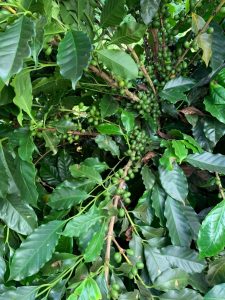
Youthful Pacamara varietal coffee beans – our experimental lot being grown at Daterra Estate in Brazil.
Our three-acre plot is on a high, flat plain in the Cerrado region near the city of Patrocínio. Daterra’s farms are located at an average altitude of over 3,000 ft and some terroirs are around 4,000 ft. The wind, sun and soil there are exceptional for Arabica trees. The diverse altitudes and microclimates on the farm make it one of the best coffee-producing areas in the country. With dry winds on pleasantly hot days and refreshingly cool nights, conditions are perfect for amazing beans to be grown.
Checking In On Our Trees
Although much of the world has slowed down, our little coffee trees continue to grow and thrive. We are more committed than ever to continuing this work to bring you the most exceptional coffee varieties we can find. Given the circumstances around the world this year, it’s not in the cards for us to make our annual trip down to Brazil to see the farm in person. However, updates continue!
After receiving some photos from the farm, I had a chance to video-conference with Gabriel Agrelli Moreira, Daterra’s head of international sales. We spoke about the status of our project and the current health of the trees on our experimental plot. An interesting observation they made is that Daterra’s agronomists are seeing a marked difference from other coffee trees on the farm. In the rest of the crop, Daterra is beginning to see maturation, which means the coffee cherries will be ready to harvest soon.
However, the Pacamara plot is actually about a month behind the rest of the farm! Our coffee cherries are still super green. Daterra is attributing that to both the trees still being quite young, and the typical coffee cherries of the Pacamara varietal being twice the size of a normal coffee cherry. These trees will be ready for picking by the end of this month, or beginning of June. Our estimate is that we’ll yield just 7 to 10 bags (132 lbs. or 60 kg. each) in total this year. However it is likely just 5 to 7 of them will be usable. After picking the coffee is processed, milled, and sorted, there is always a loss of volume.
The Details Matter In The Final Cup
Something interesting to note in coffee trees that’s perhaps not discussed often in the coffee world, is the difference between vegetative trees versus productive trees. Vegetative trees have lots of branches, leaves, tree structure, but not a lot of production. With mature, productive trees, it’s the opposite: we see lots of flowers, seeds, and cherries. From what we can ascertain thus far, our plot seems to be more vegetative. Even when fully grown, likely these trees will produce a “medium” amount of cherries. This may not sound ideal, but actually vegetative trees, while they produce less, tend to produce better quality cherries and coffees!
Low production for this year means our focus will be on determining a processing method(s) for the Pacamara. Of the dozen or so processing methods Daterra Estate is able to offer, we have asked that they use the honey, natural process on the tree (called “raisin”), natural processing on raised beds – a traditional African processing method, washed, and anaerobic.
Another aspect of our experiment is determining taste differences between coffees grown under shade as well as full sun exposure. The mahogany trees planted alongside the Pacamara trees are still young, so shade hasn’t been quite established. We have learned that those trees may still take a few years of growth before we see any tangible benefit. We hope our patience will be rewarded!
Love At First Sip
I fell in love at first sip with the Pacamara coffee (see the short video). It has an intense plum flavor that is really pleasant. I really can’t wait to invite you in for a taste, and share the fruits of our growing experiment with you in the future.
Stay tuned! Subscribe to our E-News or follow us on Facebook, Instagram, or Twitter, so you be alerted when this very special coffee is released!
Warmly,
Steve
Steve Mangigian, Zingerman’s Coffee Company Managing Partner
Tree Town Blend is BACK!
Tree Town Blend from the Coffee Company is a caffeinated homage to Ann Arbor
Ari Weinzweig, CEO & Co-Founder of Zingerman’s
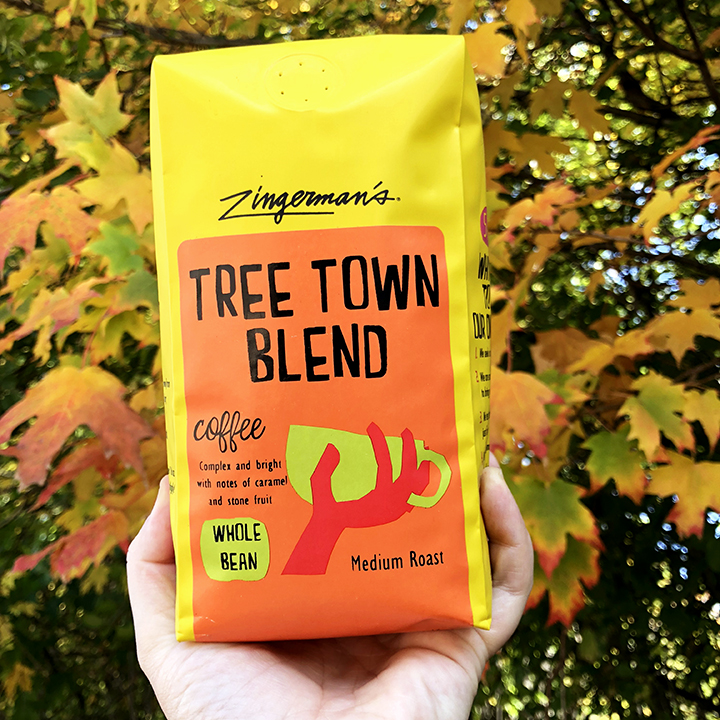
| This is our fourth year of doing this terrific Tree Town Blend at the start of the autumn season. I’m starting to weave it into my expectations of autumn’s arrival—the days get shorter, students come back to town, football season starts back up, the Jewish holidays appear on the calendar, and Tree Town Blend makes its annual appearance at the Coffee Company. Every year, the crew at the Coffee Company adjust the Tree Town just a bit to come up with something special using the best of the single-origin beans we can find. The 2021 Tree Town is a blend of beans from Brazil, Guatemala, and Uganda (last year’s had some Tanzania in place of the Uganda we chose this year), that thoughtfully makes for a lovely caramelly, cocoa-y brew with a hint of gentle apricot in the background. The Coffee Company crew say the cup is “complex and juicy!” The “Tree Town” moniker dates back much farther than the Coffee Company’s blend. It was derived over the years from the high volume of trees in the city. Until the arrival of Europeans, most of this part of the world—originally home to the Ojibwe people—was forest, but one of the first acts of newly arriving Europeans was to take down large numbers of trees for timber, and then to plow previously virgin lands in order to farm. Most of the city’s original trees were clear cut in the second half the 19th century to use for building here and for sale back east. Fortunately, early in the next century—around the time that Rocco Disderide built what’s now the Deli’s building in 1902—the city embarked on a reforestation program and as I write, we have nearly 1.5 million trees in town. Given the positive impact that all those trees have on the aesthetics and ecology of the town, it seems that all of us who live here now ought to give those who led that project a big round of appreciation. The Tree Town blend is a celebration of that beauty. Like all coffees, the flavor of the finished cup will be different depending on any number of variables like grind, water temperature, and brewing method. The Big Brew Board at the Coffee Company is a wonderful way to test out how different a coffee can taste in two different methods. (I regularly order the same coffee two different ways at the same time to try it.) I’ve tried four to five different brews of the Tree Town and all have been delicious. The staff at the Coffee Company seem to be universally high on the syphon brew right now. Thanks to the crew at Coffee too for bringing back what we here refer to as “the third grinder,” which allows us to make the Coffee of the Month into an espresso—the shots of Tree Town I’ve had this past week have been super smooth and terrifically tasty. Order one and raise a toast to trees and all the good things they do for our community. |
Excerpt from Ari’s weekly Top 5 E-Newsletter. To stay in-the-know about things that Ari is excited about in the Zingerman’s community, sign up here!
Zingerman’s Coffee for ALL.
Introducing a totally approachable new line of joe from Zingerman’s Coffee Company.
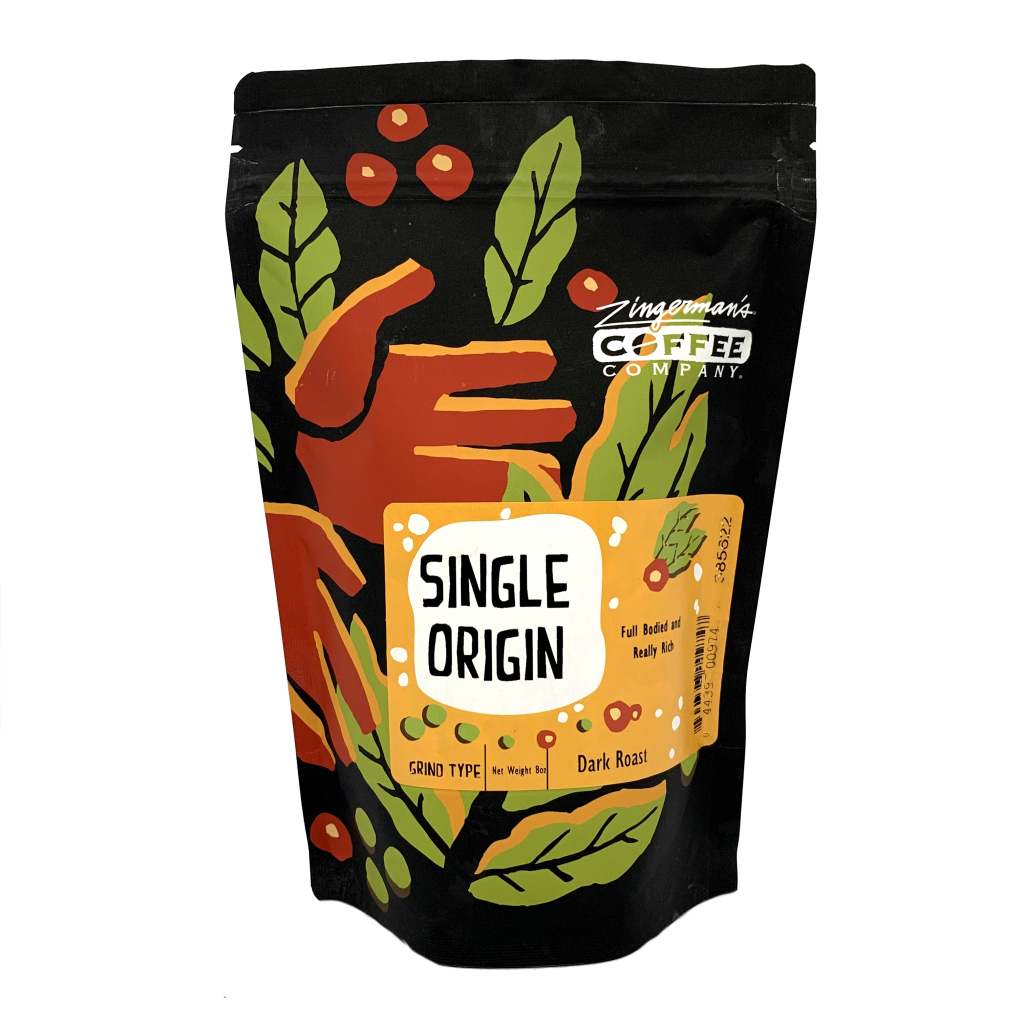
Zingerman’s Coffee Company is excited to present a new line of products to round out our presence in the specialty coffee category. The Crowd Pleasers line was conceived to be an approachable introduction to specialty coffee featuring beans with distinctive, balanced flavors.
MSRP: $7.99-$9.99
- Eye-popping packaging
- Full range of roasts
- Includes blends, a single-origin, and an actually-delicious decaf
- Re-sealable bag with valve
- Stand-up, matte black pouch
- Zingerman’s great taste; approachable price point
Coming SUPER soon!
Have questions? Interested in carrying this product?
Feel free to reach out to us at [email protected]!
DRIPPIN’ IN FRESHNESS: How to get the most out of your coffee
When we stand in our kitchens, bleary-eyed with coffee pot in hand, it’s unlikely that we’re reflecting on how this beverage—which we ritualistically consume—is made. Perfectly understandable, given that most of us don’t have any synapses firing until after the stuff hits our lips.
So, right now, in this very moment, we’d like to invite you to reflect on the laborious process and lengthy journey that those tasty, life-giving beans endure. From seedlings tended to in a nursery, to a ripe red cherries expertly plucked and processed, carefully stored and shipped across oceans. The many hands, many moons, and many miles involved to get the coffee stateside.
And that’s just the start! A coffee guru lovingly roasts those green guys into something delightfully drinkable, and packages them just so to preserve the flavor as long as possible. Then, finally, it’s yours.
Perhaps, like me, you find the long, laborious journey that coffee takes to get to you humbling, and want to introduce care and expertise to your role in it. Or, you simply have an interest in knowing the inside scoop (pun intended) on keeping and preparing your coffee so it’s as fresh and tasty as can be! Either way, read on.
FRESH, WHOLE BEANS
As you may have gleaned, freshness starts with your friendly neighborhood roaster (hey, that’s us!). Coffee is a perishable good, so, fresh coffee equals good coffee. Coffee flavor peaks mere days after being roasted, and definitely should be consumed within a month of its roast date. Does the coffee you buy have a “best by” date as opposed to a “roasted on” date? Buyer beware! This can be totally arbitrary and result in purchasing a coffee that’s stale—lacking the aroma and depth of its formerly fresh self.
PACKAGING
In addition to the roasting, how a coffee is packaged makes a huge difference. If your coffee is vacuum-sealed, it was likely aged before being packaged – this is because coffee releases CO2 gas after being roasted (in a vacuum-sealed bag, well, it would go ka-boom!). One-way valve-sealed packaging is the way to go, as it lets gas from fresh coffee out, but no oxygen in.
GRINDING
And what about the beans themselves? Do you buy them pre-ground or whole? Pre-ground coffee loses its freshness much faster, given that more surface area is exposed to oxygen and moisture, elements that are none-too-kind to coffee. Some coffee folk say that pre-ground coffee starts losing its freshness within 30 minutes of being ground! Compare that to whole bean, which will stay fresh for nearly a month.
Your local roaster will likely grind your coffee beans for you if you don’t want to invest in a home grinder. Grinding your beans at home, however, is not only a great way to tell if your coffee is fresh or not (if the coffee aroma fills the kitchen as you grind the coffee, it’s fresh. If not, it’s stale!), but it allows for you to properly calibrate the fineness of the grind needed for your particular brewing method(s), and to get the freshest possible coffee. We recommend getting a grinder that uses burrs rather than blades, because burr grinding produces more uniform coffee particles, and improves the quality of flavor extraction you get from your grounds when you brew.
Here in the café, we sell the Rocky Rancilio Grinder, which, unlike many home grinders has replaceable burrs. It’s ideal for espresso, but can be set to accommodate a full range of brewing methods. We also carry the Bodum Bistro Grinder which, conversely, is not ideal for espresso but accommodates all other brewing methods. Furthermore, this grinder crushes beans between stainless steel conical burrs rather than slicing them. This preserves the bean’s intrinsic flavor and aroma while providing a consistent grind.
STORING
Whether you buy pre-ground or whole bean, how you store your coffee is an important aspect to maintaining freshness as well. Again, light, oxygen, and moisture are enemies of coffee! If you can’t keep your coffee stored in a pantry, make sure it’s in an opaque container. And, regardless, air-tight storage is ideal. We also don’t recommend freezing your coffee. Thawing and refreezing coffee can cause freezer burn, affecting flavor. If you have a lot of coffee on-hand and and want to keep vibrant for as long as you can, make sure to divide it into pre-portioned bags before putting it away in the freezer. This way, you’re taking the coffee out of the freezer just once!
CLEANING
Finally, when is the last time you cleaned your coffee gear? Coffee oils can build up on your equipment, and minerals from hard water can form scale deposits that can affect how your equipment functions. We carry coffee equipment cleaning products in our cafe. If you are curious about what cleaning your gear needs, come chat with us!
We know you love (or at least need) your morning cup o’ joe, and would like to invite you to consider the preparation and storing of the stuff to be as much a part of your daily ritual as brewing and drinking it. Our coffee is a labor of love from around the world, and its journey ends in your hands!
Uganda Rwenzori Coffee
New Coffee of the Month from East Africa
Ari Weinzweig, CEO & Co-Founder of Zingerman’s
| While so much has been turned topsy turvy over the last year, one thing that has provided comfort and consistency throughout has been the quality of the beans at the Coffee Company. In fact, I would venture to say, through all the ups and down of the last twelve months, the coffee has actually gotten better. The April Coffee of the Month—from the mountains of southwest Uganda—is pretty darned amazing. Coffee originates to the north of Uganda in Ethiopia—it’s grown wild there for far longer than humans have been consuming it. Coffee is a relatively recent arrival in Uganda, essentially part of the same Industrial Age push to identify export crops that brought coffee to Central and South America. Today Uganda produces about 4% of the world’s coffee, tiny by the standards of say Brazil, but about four times where it was in the early years of the 20th century. |
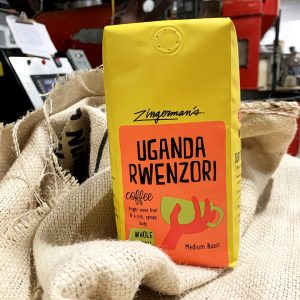
The Rwenzori mountains where these beans are grown are near the country’s western border with the Democratic Republic of the Congo, and to the north of the Rwandan frontier. You’ll see the mountains on the map about halfway between Lake Stanley and Lake Edward, to the west of Lake Victoria (Africa’s largest lake). The mountains range up to 16,000 feet, and the coffee is grown in the lower (but still high) altitudes in the shade of banana trees, which protect the delicate coffee cherries from “burning” in the sun. The coffee is a “natural process”—dried in the sun—which concentrates the sweetness and the flavor in a way that I love.
Steve Mangigian, long time managing partner at the Coffee Company, says, “We immediately loved the fruitiness of this coffee. That’s what caught my attention. It exemplifies the characteristics of great East African coffee.” Juicy peach notes (speaking of which, the Peach Truck is coming to town this summer), maybe you could say even a bit of nectarine. It’s nicely chocolatey and terrifically tasty. It’s very good straight out of the Fetco pots at the Coffee Company, Roadhouse, and Deli. If you’re at the Coffee Company it is particularly chocolatey in a pourover and delicately delicious brewed in a syphon pot. Add a piece of the Bakehouse’s marvelous Mandelbread or a Big O Oatmeal Raisin cookie and bring a bit of beauty to your day!
Excerpt from Ari’s weekly Top 5 E-Newsletter. To stay in-the-know about things that Ari is excited about in the Zingerman’s family, sign up here!
ZINGERMAN’S COFFEE COMPANY – SERVICE UPDATE
To our wonderful guests,
We want to share with you our updated service guidelines here at Zingerman’s Coffee Company:
- We will be closed on Friday, April 9th & Saturday, April 10th after having received notification that one of our staff members tested positive for Covid-19. During this time, we will sanitize our retail space above and beyond the guidelines set forth by Washtenaw County Health Department.
- Out of an abundance of caution, along with the recent request from Governor Whitmer, we are pausing indoor dining and seating for the next two weeks. You’re welcome to enjoy the nice weather on our patio and dine outside!
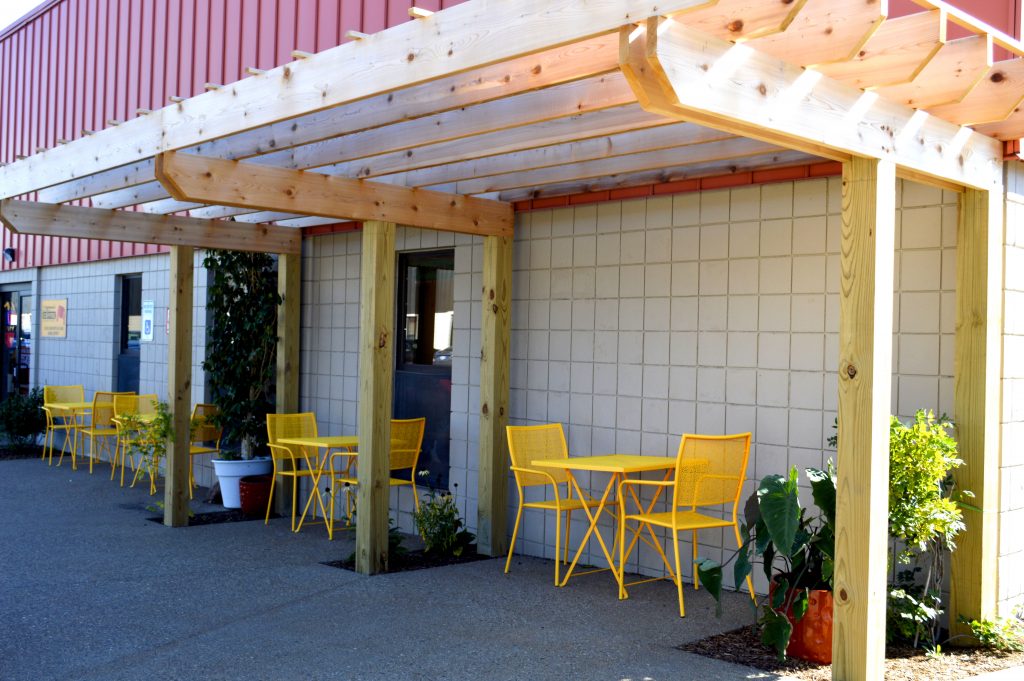
- As always, you are required to wear a mask. While in line or otherwise in the cafe, do not remove your mask to eat or drink.
- We are pausing our toast bar and hand-brew offerings for now.
- You can order online for in-store pick-up via our Square store. Ordering via Snackpass and GrubHub will be paused for now as well.
– We plan to re-open on Sunday, April 11th, 7am-4pm –
We’ll stay in touch with updates on our service guidelines as we adjust our staffing in the coming days. We are beyond grateful for your support and patronage in these difficult times.
Warmly,
Zingerman’s Coffee Company team
Erlita’s Lot Coffee from Peru
Grown, harvested, sold, and shipped by women
Ari Weinzweig, CEO & Co-Founder of Zingerman’s
Back in 2004, Isabel Uriarte Latorre co-founded Café Femenino, an organization dedicated to empowering women on the front lines of the coffee industry. From the get-go, she built the business to support women in the work world financially, spiritually and socially. The project allows women to produce high-quality coffee and get paid commensurately—they’re not stuck bargaining with aggressive buying agents out on the marketplace. And, as per what I wrote above, to boost the energy of women who had generally been left out, ignored, or even abused, and help them reclaim the full lives to which they have always been entitled. The folks at Café Femenino share that:
“Women in remote and rural coffee communities face a host of challenges that keep them trapped in poverty. Many of these isolated women live in male-dominated societies and have very little financial control or decision-making power. 464 women farmers in northern Peru decided to change this dynamic by separating their coffee production from the men’s. In that moment, for the first time, this group of women created their own product and income… to support social justice and empowerment for women coffee producers worldwide.”
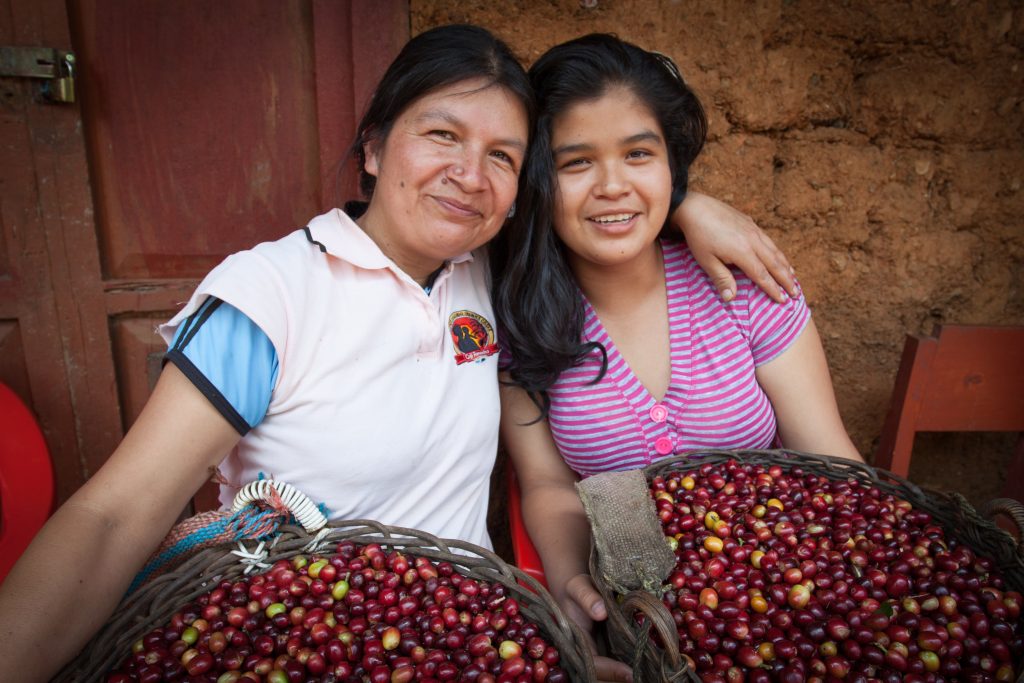
Coffee production came to Peru in the 1700s. After two centuries, the heirloom typica variety still comprises 60 percent of the country’s exports. There are more than 110,000 coffee growers in Peru, most of whom are indigenous to these landscapes and speak Spanish only as a second language. The average land-holding farmer lives on less than three hectares, hours from the comforts of electricity and running water. Erlita Baca Arce’s farm is near the Peruvian village of Nueva York, a small coffee community in the Amazonas region of northern Peru, east of the Andes Mountains, at 5700 to 6500 feet above sea level—an ideal altitude for high-quality Arabica coffee trees. Erlita has been part of the project since its inception and now serves as the treasurer of the coop, and as she explains:
“Café Femenino has given me many opportunities to improve the quality of my coffee and the quality of life for my family. I invest the premium I earn in improving our community, providing education for our daughters, and improving the food that we feed our families. Café Femenino has been wonderful in improving the self-esteem and empowerment of the women in our community.“
Erlita is not alone in her positive comments. Every article I’ve read about Café Femenino details outstanding results: increased local recognition of the work the women are doing, both in the fields and on the home front; a reduction in abuse (physical, emotional, and sexual); an increase in income; more men are participating in child care and housework; and upswing in school attendance among local girls. In addition, because the female coffee producers in the area now have the potential to get a better price for their coffee, many men are signing the deeds of their land over to their wives so their coffee will be eligible for Café Femenino designation.
While dignity, meaningful work, and good coffee are always in season, National Women’s History Month is a particularly good time to take notice of Erlita’s Lot. The history of the event goes back over a century to the years before WWI and the Spanish flu, to the end of February 1909, when “National Women’s Day” was sponsored by the Socialist Party of America. By March of 1911, International Women’s Day (IWD) was marked by over a million people demanding the right to vote for women, workplace safety, equitable pay, etc. Six years later, on March 8, 1917 in the Russian capital of Petrograd, women workers took to the streets for National Women’s Day, demonstrating en masse in an event that unexpectedly turned into the Russian Revolution. The Tsar abdicated a week later, on March 15. Leon Trotsky wrote, “March 8th was International Women’s Day, and meetings and actions were foreseen. But we did not imagine that this ‘Women’s Day’ would inaugurate the revolution.”
The Erlita’s Lot coffee is as great as the story behind it. Smooth, a bit of dark chocolate, maybe even like a piece of toasted Country Miche bread from the Bakehouse. The coffee has a surprisingly clean finish and modestly full mouthfeel. All the brew methods have been good, but I’m stuck on the smoothest flavor of the bunch, which I found to be Chemex (the syphon pot and the Clever brewing weren’t far behind). Sip some of this great new coffee and nibble on a Bakehouse oatmeal raisin cookie. Erlita’s Lot is available at the Coffee Company, Next Door at the Deli, and at the Roadhouse. Sit, and appreciate the morning as we move into spring. And because I seem to have a proclivity of late for Peruvian poets, here’s a short one that seems right for the moment from surrealist writer Blanca Varela:
it’s seven in the morning
it’s the perfect time to start
dreaming
the coffee becomes eternal
and the sun eternal
if you don’t move
Excerpt from Ari’s weekly Top 5 E-Newsletter. To stay in-the-know about things that Ari is excited about in the Zingerman’s family, sign up here!
This single-origin supports and empowers female coffee producers
March’s Roaster’s Pick coffee tastes great, and gives back.

Our single-origin Roaster’s Pick for the month of March – Peru Erlita’s Lot – comes to us from the finca (or, farm) of Erlita Baca Arce, one of the cofounders of Cafe Femenino®, a program created to support and empower female coffee producers. The program originated in Peru and has since grown into a movement, present in remote coffee-growing regions in nine countries.
Erlita’s circumstance was typical of many women working in coffee in Peru: while they have always been crucial to coffee production, men traditionally held the economic power. In 2004, 464 female coffee producers in Peru united to change this dynamic and take a step toward empowerment by creating the first Café Femenino co-op.
This coffee has so many delicious layers! On first sip, it has a deep fruitiness that reminds us of plum. It also has a rich, toffee-like sweetness and a full, creamy body.
Now that female coffee producers have a potential to get a better price for their coffee, men are often signing the deeds of their land over to their wives so the product is eligible for Cafe Femenino designation. Men supporting women’s work is helping to create healthier communities.
Erlita and the other women of Cafe Femenino are strong role models for their communities and are inspiring future generations. Her daughter, Ketty, is attending university and studying to be an Agricultural Engineer.
Erlita’s farm is in Nueva York, a small coffee community in the Amazonas region of northern Peru, east of the Andes Mountains. The Amazonas is a high-elevation area, typically 5700-6500 feet above sea level – ideal for coffee trees.
For the whole month of March (National Women’s Month):
When you buy a bag of Peru Erlita’s Lot coffee, 10% of the proceeds go to an Early Education Center grant, benefitting the pre-school children of 15 communities in Peru.
For Monday March 8th, 7am-4pm
(International Women’s Day):
Zingerman’s Coffee Company will be brewing Peru Erlita’s Lot coffee all day on Monday March 8th, in honor of International Women’s Day! 100% of the proceeds from your cup of coffee will be donated to an Early Education Center grant, benefitting the pre-school children of 15 communities in Peru. Stop by to support a great cause!
An integral part of Café Femenino is the Cafe Femenino Foundation, a registered 501(c)(3) non-profit. Working within the Café Femenino Program, the foundation funds projects that the women farmers prioritize. These projects foster positive change in gender equality and reduce poverty and abuse in the coffee-producing communities.
A word about this grant, from the Foundation:
“The children in rural Peru are severely malnourished, this grant provides funds needed to educate the teachers, parents and students on food nutritional value and how to incorporate the foods into their daily diet with the goal of reducing malnutrition in the rural coffee producing communities in Peru. The Cafe Femenino Foundation has supported the implementation of this project since 2013. Each year the impact is measured by a visiting nurse taking and recording, the height and weight of the students ages 3-5 three times per year. In total, 230 students, 140 parents and 25 teachers in 15 rural early education centers will participate in this program. The curriculum for the early education center students also includes personal hygiene and dental care.
Funds will cover the cost of the traveling nurse, as well as materials needed for the early education centers such as toothbrushes, toothpaste, soap, wash clothes, crayons, books, paper, glue, lunch boxes, mats for the floor where the children sit and play for each education center.
Desired results of this program are to contribute to the improvement of the nutritional status of the pre-school children in the 15 communities while providing the children and parents with information that increases their knowledge of proper nutrition, dietary resources available in their community and set them on a path of improved future health.”
Zingerman’s Coffee Company – February Dine-In Update
To our wonderful guests,
February 1 is here, and we want to share with you our updated guidelines here at Zingerman’s Coffee Company, given the recent direction from the State of Michigan to allow restaurants to reopen dine-in service:
- Indoor seating will be available for to enjoy – for a maximum of 30 minutes – from 7am-4pm daily.
- As required by the Michigan Department of Health and Human Services (MDHHS), tables will be 6 feet apart, no more than 6 guests are allowed at a table, and we will have limited seating capacity.
- You are required to wear a mask unless actively eating or drinking, and we are required to collect your contact information for contact tracing.
- Due to limited seating, it is available on a first come, first served basis.
MDHHS very clearly reminds us that indoor dining remains high risk, and asks us all to consider reducing our risk by choosing takeout, delivery, or outdoor dining.
We hope you will continue to:
- Order online for contact-free, in-store pick-up
- Swing by our cafe and consider taking your coffee to go
- Order for home delivery via GrubHub
- Stock up and stay safe with our 5# bags of coffee, delivered nationwide!
We are beyond grateful for your support and patronage in these difficult times. We’ll keep you posted on any changes as soon as we can!
Warmly,
Zingerman’s Coffee Company team


